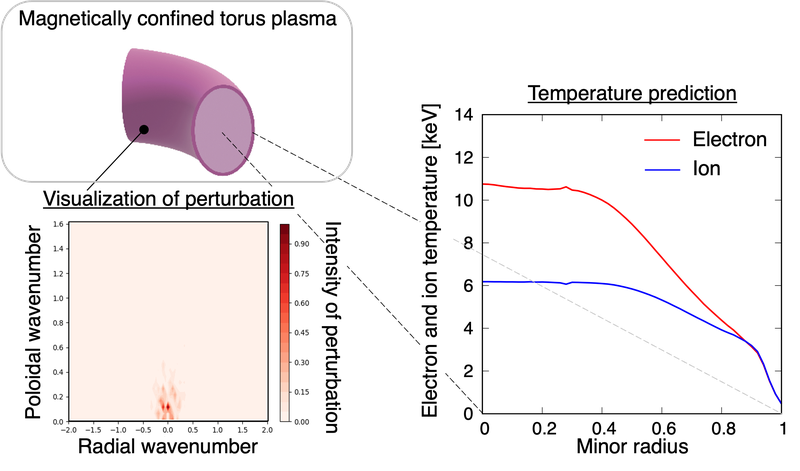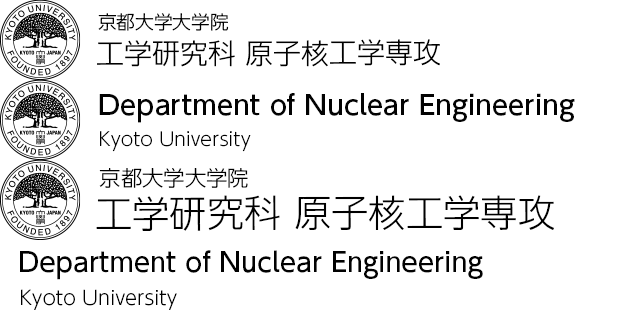Nuclear Energy Conversion
In order to achieve the economic, environment and safety energy system in the future, we are studying on the science and engineering of utilizing nuclear energies based on the fundamental understandings of physics of energy production and conversion. We focus on the thermal and fluid engineering regarding to effective and safe utilization of energy: especially, the establishment of multiphase flow science and engineering.
Academic Staff
Takehiko YOKOMINE
 Professor (Graduate School of Engineering)
Professor (Graduate School of Engineering)
Research Theme
Thermo-hydraulic related to Nuclear Fission/Fusion Reactor, MHD turbulence, Multiphase flow engineering, Erosion, Renewable Energy System
Contact Information
Katsura Campus C-cluster, C3-d2S04
TEL: +81-75-383-3922
FAX: +81-75-383-3922
E-mail: yokomine@* (Add "nucleng.kyoto-u.ac.jp" after @)
Eiji HOASHI
Associate Professor (Graduate School of Engineering)
Research Theme
Thermo-hydraulic Engineering related to Nuclear Fission/Fusion Reactors; Research on Fusion Neutron Sources and on Heat-transfer Devices based on Magnetohydrodynamics and Multiphase-flow Engineering for the Early Social Implementation of Next-generation Nuclear Power Plants and Fusion Reactors.
Contact Information
Katsura Campus C-cluster C3d-Building d2S02
TEL: +81-75-383-3923
E-mail: hoashi.eiji.4r@* (Add "kyoto-u.ac.jp" after @)
Emi NARITA
Junior Associate Professor (Graduate School of Engineering)
Research Theme
Turbulent transport analysis and modeling with numerical simulations toward performance predictions of fusion plasmas
Classes
Mathematics for Computation, Fundamentals of Magnetohydrodynamics
Contact Information
Katsura campus C-cluster C3d-Building d2S04
TEL: +81-75-383-3903
FAX: +81-75-383-3903
E-mail: narita.emi.5s@* (Add "kyoto-u.ac.jp" after @)
Research Topics
Direct numerical simulation study on multiphase flows
Development of numerical simulation procedure to solve various multiphase flow problems and boiling phenomena in pipes and enclosures (see Fig.1). Research on air-sea interaction due to wind driven turbulent shear flow concerning to the global warming problem: investigation of carbon dioxide absorption into the sea (see Fig.2).

Figure 1:Direct numerical simulation of sub-cool pool boiling in an enclosure

Figure 2:Direct numerical simulation of air-sea interaction due to wind driven turbulent shear flow
Experimental study on multiphase flows
Study on boiling and convective phenomena of liquid metals under magnetic fields and two-phase flow phenomena in a nuclear rector: two-phase cross-flow through a simulated fuel rod bundle assembly (see Fig.3). Study on fundamental multiphase flow phenomena: formation of ring-typed bubble (see Fig.4).

Figure 3:Gas-liquid two phase flow through tilted rod bundle

Figure 4:Production of a ring-typed bubble
Study on micro-scale two-phase flow phenomena
Fundamental study on micro-bubble flows and interaction with turbulent flows. Application of micro bubble technology to the environmental problems. Investigate surface tension driven two-phase flows in micro-channels for application to the space technologies and so on.

Figure 5:Fundamental study on two-phase flows in a micro-channel: (a) a film flow pattern and (b) a slug flow pattern in a pipe of 50µm.
Study on fusion plasmas using machine learning
Particle and heat transport in fusion plasmas is largely governed by turbulence. Neural network models are advantageous to understanding and predicting turbulent transport. Such models can analyze visualized turbulent perturbations and predict transport fluxes much faster than conventional models.

Figure 6: Visualized turbulent perturbations in the wavenumber space, and temperature predictions using a machine learning-based turbulent transport model
